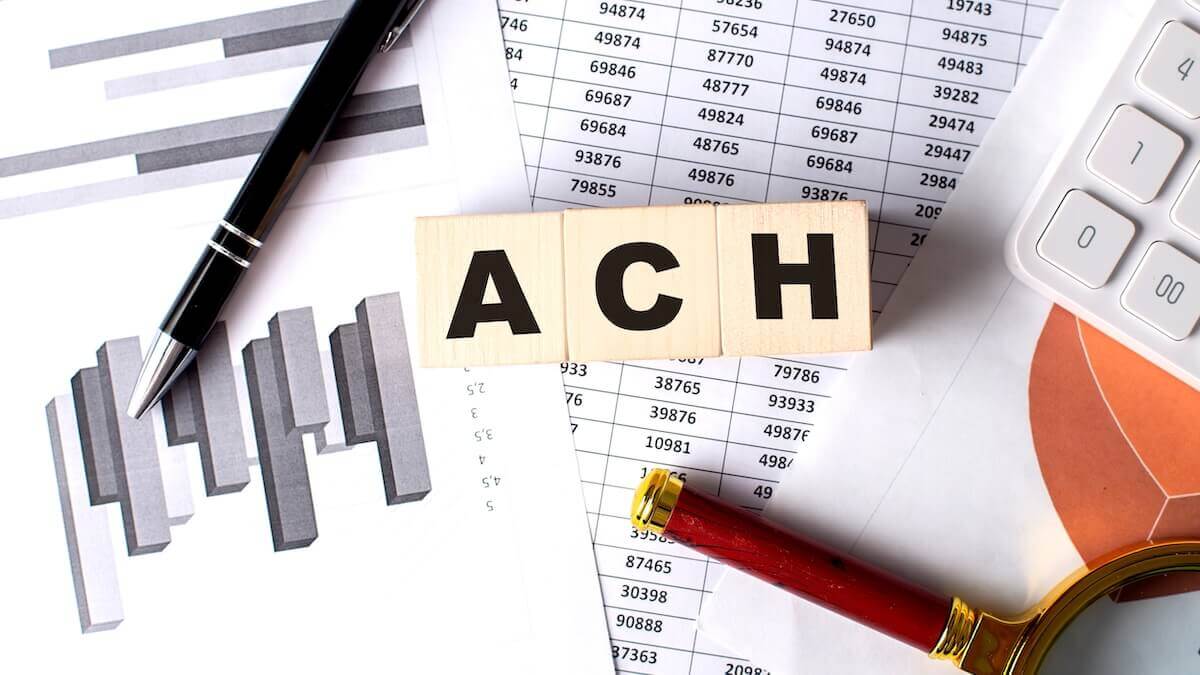Best tax preparation software for small business
Find the best tax preparation software for your small business. Simplify your filing process and ensure accuracy with top-rated tools.

Automated Clearing House (ACH) is a network used for electronic bank to bank transfers. ACH payments are low-cost and reliable. For service, membership and subscription based businesses, they make recurring billing a breeze.
Let’s look at how to accept ACH payments, as well as the benefits and disadvantages of them.
Discover Wise Business:
The easy way to accept
international payments
How to accept ACH payments depends on what type of ACH payment you use. There are:
ACH debit payments involve you pulling funds from your customer's account. This can be either one-off or recurring.
ACH credit payments involve your customer "pushing" funds to your business account. These are usually made for one-off payments. You can also use this type of ACH payment to pay your employees, contractors and suppliers.
To accept ACH payments, you’ll need to:
| 💡 Open a business account online with Wise Business. The easy to set-up, easy to use business account that you can connect with Stripe. |
|---|
An ACH authorization form allows you to pull funds from your customer's account.
ACH authorization forms should contain:
ACH authorization can be completed online. It can also be completed over the phone or in the mail, depending on how you’ll accept future ACH payments.
For ACH authorization collected via phone, you need written proof for recurring payments. For one-off payments, an audio recording can be collected as proof.
To accept ACH payments online, the best option is to use a payment gateway. You can enable ACH payments on your payment gateway provider for an extra fee.
| 🔍 Read on to find out more: |
|---|
You can set up ACH processing through your business bank account. If you go through your bank account, you can provide your customers with your bank details. This enables them to initiate the payment.
If you’re looking to use ACH direct debit often, using a third-party payment processor can be valuable. You should compare providers and check their terms and conditions before selecting one.
To accept recurring ACH payments, you can either use a third-party payment processor or your business bank account.
Which is better will depend on the fees. ACH payments incur fees that are either a flat percentage or flat fee per transaction. Some providers also charge monthly fees for extra features.
Recurring ACH payments are best suited to service, membership or subscription-based businesses. This allows your customers to set it and forget it when it comes to payment.
To accept a recurring ACH payment, you’ll need to collect your customer's bank details. You'll also need their authorization.
Your bank will then send ACH payment instructions to your customer’s bank when the payment is due. Your customer’s bank will pull the funds, sending them to your account. This process will repeat itself every time the subscription payment is scheduled.
Accepting ACH payments comes with a range of benefits.
Lower fees
ACH payments generally cost less than credit card payments and wire transfers.
Fees for ACH payments are normally around 1% when charged as a percentage of the transaction. With some providers, you can receive volume discounts for frequent ACH processing. Depending on the fee structure you use, your customer might be liable to pay the fee rather than you. This would reduce the cost even further.
Recurring ACH payments are more reliable
Canceled credit cards can make subscription and membership-based businesses hard to run. People often cancel or max out their credit cards. If your customer does this, you won’t be able to collect payment from them
Customers are far less likely to change bank accounts regularly. This makes recurring ACH payments more reliable. This means less late payments for you and increased cash flow.
Convenient and secure
Recurring ACH payments are straightforward to set up. They make it easy for your customer to pay for a subscription or membership.
ACH payments are also highly secure. The federal government regulates the ACH network. ACH payments use a variety of security features to secure their payment flows. Fraud is less prevalent with ACH payments compared to credit card payments. It also tends to be easier to dispute ACH charges compared with credit card charges.
Despite their benefits, ACH payments are not without challenges.
Slower settlement times compared to other payment methods
ACH payments are normally quicker than traditional wire transfers. But when compared to credit and debit card or PayPal transactions, ACH can’t compete.
Some providers offer same-day ACH payments. But not every provider does this. And even if they do, they're still slower compared to instant card transactions.
Limited scope for international business
ACH payments are best suited to domestic transfers between US banks. You can make international ACH payments with a growing number of banks. But settlement times are slow and there are better options available.
Not suitable for in-person transactions
ACH payments are not suited to in-person POS terminals. Collecting this information and setting up the payment would be inconvenient. Especially when compared to accepting card payment.
Here are some FAQs about ACH payments.
Is ACH payment safe?
ACH is managed by the National Automated Clearing House Association (NACHA). It's also regulated by the federal government. ACH isn’t required to be PCI-compliant. But it still uses various methods to ensure security for payers and payees:
These features make ACH a secure payment method.
How long does it take for ACH payments to clear?
ACH debit payments are processed three times during a business day. If you submit your ACH file after the cut-off time, it’ll be processed on the following business day.
The standard time for ACH payment processing is 3 business days.
Instant ACH payments are unavailable. But you can opt for same-day ACH payments at participating banks. Keep in mind that same-day ACH payments are unavailable for international ACH transactions. Same-day transactions incur extra fees and have a cap of $1 million USD per transaction.
ACH payments are a great option for subscription, membership or service based businesses. For low fees, you’ll be able to pull funds from your customer’s bank account, making recurring billing easy.
Just remember that ACH transfers aren’t instant. And for international business, there are better options out there.
Wise Business can help you save big time on international payments.
Wise is not a bank, but a Money Services Business (MSB) provider and a smart alternative to banks. The Wise Business account is designed with international business in mind, and makes it easy to send, hold, and manage business funds in currencies.
Signing up to Wise Business allows access to BatchTransfer which you can use to pay up to 1000 invoices in one go. This is perfect for small businesses that are managing a global team, saving a ton of time and hassle when making payments.
Some key features of Wise Business include:
Mid-market rate: Get the mid-market exchange rate with no hidden fees on international transfers
Global Account: Send money to countries and hold multiple currencies, all in one place. You can also get major currency account details for a one-off fee to receive overseas payments like a local
Access to BatchTransfer: Pay up to 1000 invoices in one click. Save time, money, and stress when you make 1000 payments in one click with BatchTransfer payments. Access to BatchTransfer is free with a Wise Business account
Auto-conversions: Don't like the current currency exchange rate? Set your desired rate, and Wise sends the transfer the moment the rate is met
Free invoicing tool: Generate and send professional invoices
No minimum balance requirements or monthly fees: US-based businesses can open an account for free. Learn more about fees here
*Please see terms of use and product availability for your region or visit Wise fees and pricing for the most up to date pricing and fee information.
This publication is provided for general information purposes and does not constitute legal, tax or other professional advice from Wise Payments Limited or its subsidiaries and its affiliates, and it is not intended as a substitute for obtaining advice from a financial advisor or any other professional.
We make no representations, warranties or guarantees, whether expressed or implied, that the content in the publication is accurate, complete or up to date.

Find the best tax preparation software for your small business. Simplify your filing process and ensure accuracy with top-rated tools.

Unlock Canadian commercial real estate opportunities. A complete guide for US residents on legal compliance, 35% down payment rules, and cross-border tax tips.

Explore the best electronic payment methods for your business. Secure, fast, and convenient ways to accept online payments.

Learn how to buy commercial property in Australia with our expert guide to the process, costs, FIRB, and saving money on international payments.

Ready to diversify? Discover how US investors can navigate the Indian commercial real estate market, from legal compliance to closing the deal. Read more.

US investors: Learn how to buy commercial property in Dubai with our comprehensive guide to the process, costs, and smart money transfers.